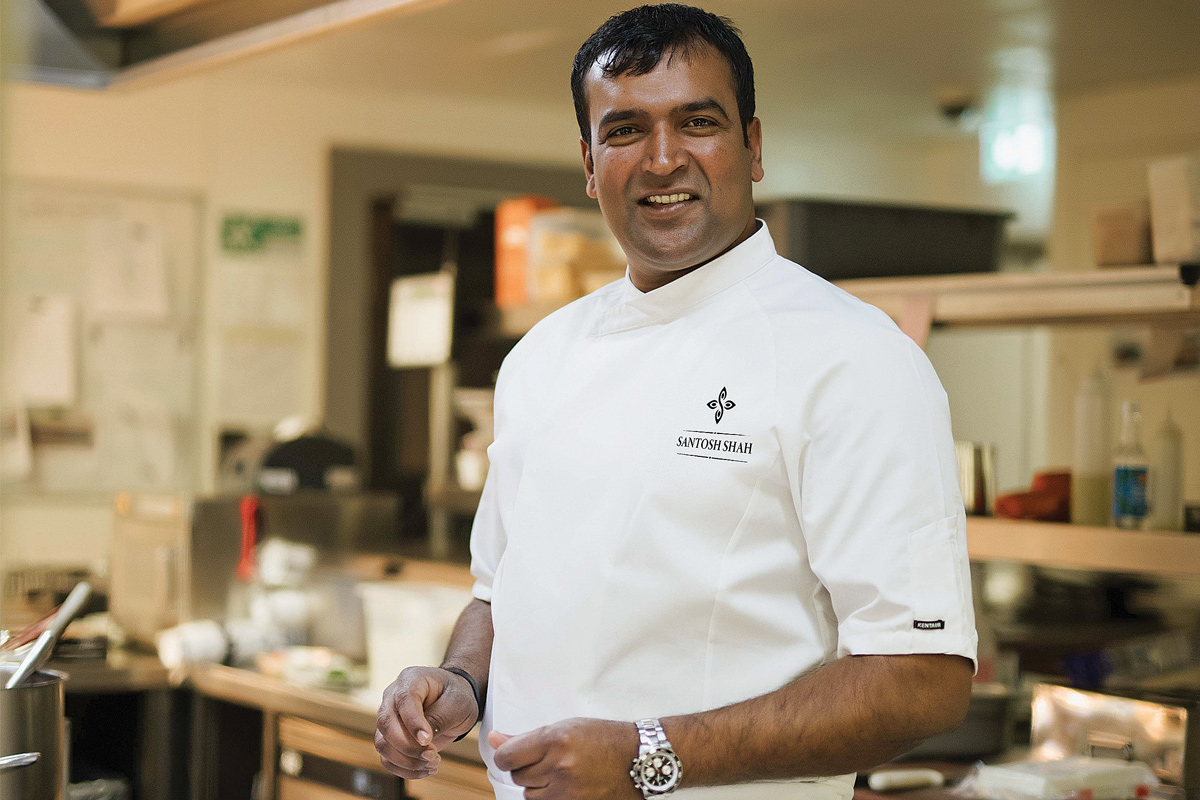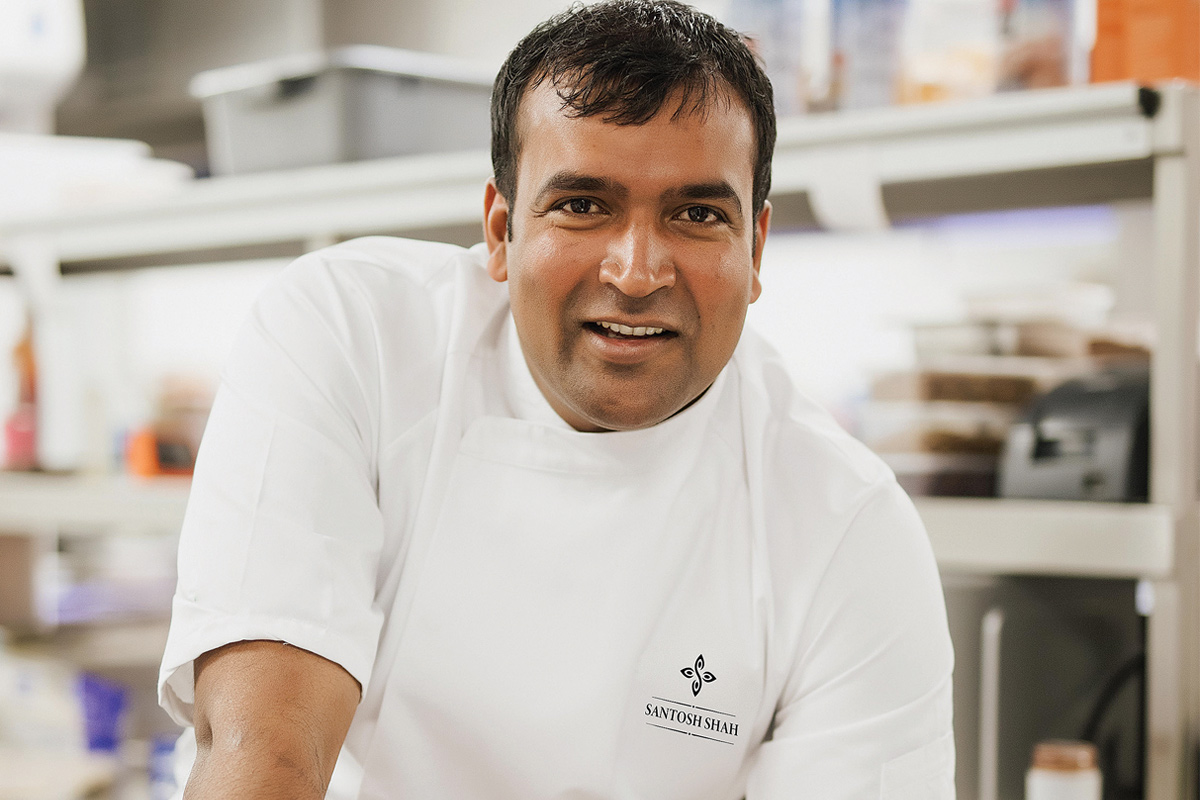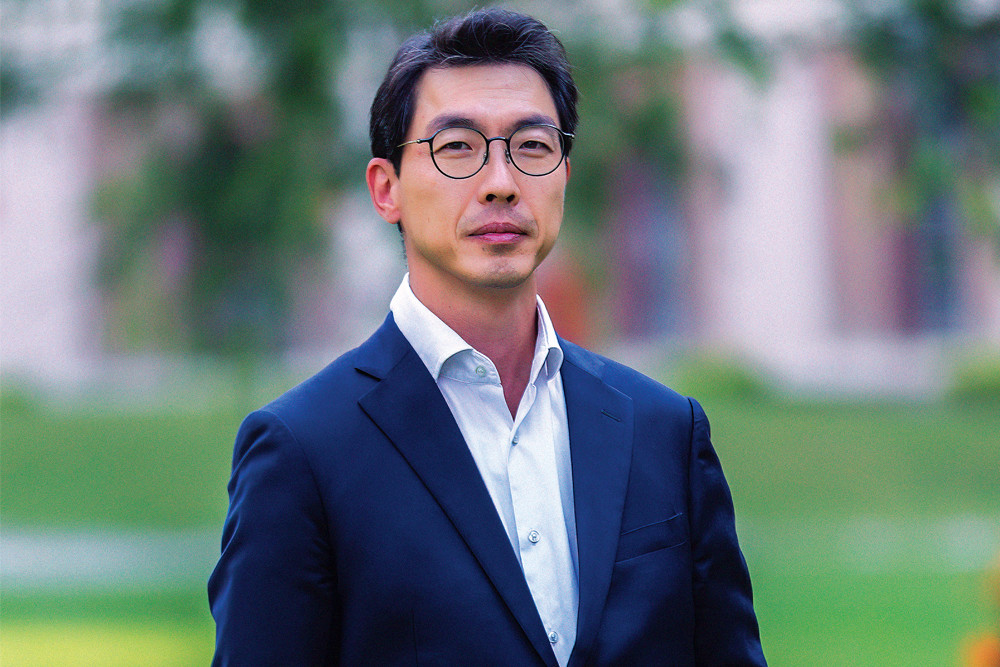
Santosh Shah rose to fame when he participated in the reality show MasterChef: The Professionals 2020 and reached the finals. Overnight, he became a household name among Nepalis back home. He says that he has taken part in other cooking shows as well but this one catapulted his fame to unimaginable height.
Shah has had a humble upbringing. He was born in Karjanha, a village in Siraha, Nepal but left for India at the young age of 15. He toiled in a hotel and studied at the same time completing his diploma in hotel management. Within seven years of starting his career, he became executive chef in a 5 star hotel in Gujarat, India. He worked for 10 years in India before shifting base to Montenegro. However after working for a year there, he could forsee no growth opportunities and retracted his path back to Gujarat to work with another five star property. Here, Shah organised a food festival that was featured by Times of India and other newspapers and magazines. The coverage caught the attention of a gentleman from London who offered him to come work at his restaurant in London. This was towards the end of 2010.
However, since Shah had worked in big establishments, the restaurant environment confined him. Restless, he moved to another restaurant. But he had always aspired to become a Michelin star chef and with that desire propelling him, he applied for a job at a Michelin restaurant, Benares in Central London. He worked there for three years, and then went to France to study French cuisine. On returning, he landed a job at The Cinnamon Collection owned by celebrity chef, Vivek Singh. Shah then entered the BBC MasterChef representing the same group.
In a Whatsapp phone interview with Business 360’s Ujeena Rana, Shah talks about his aspirations, a cooking show, a book deal and why Nepal’s tourism entrepreneur Karna Sakya of the famed KGH group must be proud of him. Excerpts:

How did you get into MasterChef: The Professionals?
I have participated in a few culinary competitions in the UK like ‘National Chef of the Year’ in 2019 which is considered to be a more tough competition than MasterChef. But that one is not shown on TV. While I was working in Benares which is more than five years ago, the idea to get into MasterChef hammered its way into in my head. However, at that time, I was planning to take Indian food into the competition as I was working in an Indian restaurant. But two years back, I started toying with the idea of opening up my own fine dining Nepali restaurant in London. I started to do research and experiment with cuisines for the menu. Then I thought of showcasing Nepali cuisine and introducing it to the world via the reality show. Moreover, I knew that such exposure will benefit my restaurant as well.When do you plan to open your fine dining Nepali restaurant?
If Corona had not hit the world, my Nepali fine dining restaurant would have been established by now. The pandemic rained on my parade. But that’s in the pipeline. The project is ready; we are looking for a location in London.How do you read the demand for Nepali cuisine in England?
Earlier Nepali food had its existence but under the shadow of Indian food. It paled in comparison to Indian food so to say. Even if Nepali food was served, it was done in the guise of an Indian name. MasterChef is considered to be one of the best TV reality shows in the UK. It comes in the top three in all the programs in the UK. Last year, 4.5 million viewers were attracted to watch the MasterChef final episode. I am confident; this time around as well millions were glued to the program. Because of the program, Nepali cuisine is now placed in the world food map. Nepali cuisine has a bright scope now. After the popularity of the MasterChef, I am informed that people call up Nepali restaurants to inquire if they have the cuisines that I presented in the competition.Walk us through your research process for Nepali cuisine and how you made use of the same during the MasterChef.
I wanted to create a fine dining cuisine that’s why first of all I began with research. I divided the map of Nepal into Terai, mountains and Himalayas. Then I prepared a list of foods that I have heard and never heard of from these regions. I continued my research based on ethnicity and culture: Rai, Tharu, Newari, etc. Then I prepared a list of foods that Nepalis consume during festivals because festive foods are different based on geography and culture. Since I had been researching and experimenting on Nepali foods and since I was headed to MasterChef with the intention to promote Nepali food in the show, when we were given an octopus to work with, I marinated it with spice powder made of timur, jeera and meethi. I served the dish along with bhang ko chutney, karkalo ko paat and sadeko dahi. I also deconstructed jeri in the show. I also prepared gundruk and sadeko bhatmas, tama ko achar, aloo ko achar, bethe ko saag. I also used jimbu in my dishes.You have been away from home for a long time. How would you define the struggle of an immigrant in a foreign country?
For some even a petty matter would look like a colossal struggle. It all depends on perspective actually and how one handles the situation. I washed dishes when I went to India and then in the UK. I don’t know if that can be termed as struggle; after all work is work. I am facing issues opening up a restaurant, should I call it struggle, of course not. The situation is such because of Corona. Nevertheless, I had to scratch my head to prepare the Nepali cuisine. It required a lot of hard work.
Tell us about the kind of support showered on you on social media platforms during your participation in the MasterChef.
That was an amazing feeling indeed. I was doing something for the country to promote the cuisines hither to unknown to the larger world. I was doing something for the country and people could see that and I suppose that is what led them to come forward in my support. I was active on social media. I was giving interviews, as many as possible. I allowed myself to be seen as an inspirational source for aspirants. Hari Bansha Acharya, Baburam Bhattarai, Binod Chaudhary and others tweeted about me. I suppose, people took it as a national event. People realised that I had not participated in the competition to win but to put Nepali cuisine on the world map.You have said you want to meet Karna Sakya. Why?
I did not know a thing about Karna Sakya ji earlier to the competition. A few of my friends shared a screenshot with his tweet in my support. I googled him and discovered many things about him, especially his involvement and engagement in the hotel industry. I wish to meet him once I am in Nepal. My plan to visit Nepal got canceled after the new variant of Corona virus was detected in the UK. I believe Karna Sakya ji is the most proud of my achievement because he knows the kind of labour one needs to promote Nepali foods abroad. Not many people understand the passion that goes into putting that final dish on the plate.How does food define culture, relationship, emotion?
Food is a huge medium for connecting people. It can connect countries, people, and culture. We might live in a foreign country, wear their clothes, speak their language, enjoy their festivals but when it comes to food, sooner or later the food back home pulls you and you are drawn to cooking, eating and enjoying the taste of your country. Our culture is reflected through food. Childhood memories shaped by the kinds of foods I consumed as a child in the Terai played a crucial part during the MasterChef competition. Forgotten recipes need to be resurrected. Today, Master Chef is synonymous with Santosh and Santosh with Nepali food.Who do you wish should taste your cuisines first in Nepal?
Karna Sakya ji has travelled far and beyond. He understands Nepali cuisine. I wish to make him taste my creations and comment on them. I want to hear from him about my dishes. He knows the length and breadth of Nepali food. Besides, when I visit Nepal, I want to visit his house and see the kinds of foods prepared in his kitchen. Moreover, I want him to introduce me to people and places which can enrich my knowledge of Nepali food. I can modify those dishes and present to the world. There are many Nepali dishes still undiscovered.Is there any agenda behind traveling to Nepal this time?
Chances are I might visit Nepal with a TV crew for a documentary. There have been talks with a few television channels in the UK which have shown interest in making a documentary on my travel to Nepal. People are interested in me since MasterChef was a huge hit in the UK. Even though I could not be the title winner, I am hailed as the ‘real winner’. The national and local channels and magazines have announced me as the ‘people’s champion’. They say that I am unforgettable because my personality is such: my sense of humor, my background story, my down-to-earth nature, my ingenuity in creating food all played parts in putting me on that pedestal. People were depressed due to Corona and they say that I sprinkled spice in their dull life. I added entertainment. Through my cooking show, I want to feature Nepali cuisine made by mothers and grandmothers in the Terai, Himal and mountains and cook with them, learn their age-old recipes. More importantly, the documentary would be a great learning experience for me since all this time I have been doing research based in London. Besides, a cook book deal is on the way. My agent is negotiating with a number of great publishers. In that respect, many things are happening.
Published Date: January 14, 2021, 12:00 am
Post Comment
E-Magazine
RELATED Face 2 Face



.jpg)
.jpg)
.jpg)